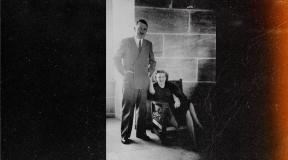Blessed are the poor in spirit, for theirs is the kingdom. Beggars in spirit
The Holy Church reads the Gospel of Luke. Chapter 6, art. 17 - 23
17. And going down with them, He stood on a level ground, and a multitude of His disciples, and a great multitude from all Judea and Jerusalem, and the seaside places of Tire and Sidon,
18. who came to hear Him and be healed of their diseases, also those who suffer from unclean spirits; and were healed.
19. And all the people sought to touch Him, because power proceeded from Him and healed everyone.
20. And He, lifting up His eyes on His disciples, said: Blessed are the poor in spirit, for yours is the Kingdom of God.
21. Blessed are those who hunger today, for you will be satisfied. Blessed are those who weep today, for you will laugh.
22. Blessed are you when people hate you, and when they excommunicate you, and revile you, and bear your name as dishonorable for the Son of Man.
23. Rejoice on that day and rejoice, for great is your reward in heaven. This is what their fathers did to the prophets.
(Luke 6: 17-23)
In today's Gospel reading, dear brothers and sisters, we become witnesses of the first sermon of Christ after the election of his twelve closest disciples - the apostles.
As we can see, many people strive to Christ, longing for a miracle of healing from burdening diseases and ailments. And the Lord lays His hands on the sick for healing. People themselves are drawn to the Savior to touch His clothes, because power came from Him and healed everyone... It was during this spiritual uplift among the multitude of people, who were even more strengthened in faith by perfect miracles, that Jesus Christ turns to his disciples and the people with the word of a sermon on the Beatitudes.
The Evangelist Luke, like the Evangelist Matthew, in the text of Holy Scripture uses the Greek word μακαριος [makarios], which can be translated into Russian as "happy" or "prosperous."
In the ancient pagan world, the gods were usually called "blessed", as well as people who were like gods, because they embodied a person's dream of happiness in myths.
This Greek word and its meaning perfectly characterize the very essence of Christianity, which is inherent in divine joy.
Let us consider the beatitudes transmitted to us from the words of Christ by the Evangelist Luke in more detail.
Blessed are the poor in spirit, for yours is the kingdom of God... In the Greek language there are two words for "beggars": penes is a working person who has nothing superfluous, a person who is not rich, but also not in need; and ptojos, which means total and extreme poverty. It is the second option that the Evangelist Luke uses. Saint Chromatius of Aquileia writes: “We know that many are poor in worldly possessions, but they have not forsaken their sins and are alien to faith in God; they obviously cannot be called blissful. Blessed are those who, despising the riches of the world and rejecting worldly possessions, wanted to become poor in the world in order to become rich in God. " In other words, spiritual poverty- this is an extreme need for God, the awareness of their absolute helplessness without Him.
Blessed are those who hunger today, for you will be satisfied. Blessed are those who weep today, for you will laugh... These words of the Savior, according to Alexander Pavlovich Lopukhin, refer to all people who have "a feeling of inner dissatisfaction and can hunger for another life and cry about the failure that befalls them in their striving for the highest perfection." Therefore, the Lord especially supports everyone who is “hungry” for the truth of God in the midst of the sin of lies and vanity, as well as a person who regrets his sins with the promise of future fulfillment and joy.
Today's Gospel reading ends with the words about a special day, when joy and gladness will be for those who will be rejected by this world and whose name will be reviled for the Son of Man.
One of the outstanding qualities of Jesus is His absolute honesty. He never left people in the dark about what to expect if they chose to follow Him. Blessed Theophylact explains to us about what slander Jesus speaks for the name of the Lord: “He is not simply reviled, blessed, but only reviled for Christ and falsely. Otherwise, he is unhappy, because for many it serves as a temptation. " Thus, the saint reminds us, dear brothers and sisters, that we should be examples of good, but not evil in this world.
Our loyalty to the Christian faith does not always entail death, but a person who insists on his good Christian name is expected to be insulted; and a person who demonstrates Christian love and Christian forgiveness is ridiculed. Jesus Christ needs witnesses today; He needs not only people who are ready to die for Him, but most importantly - people who are ready to live for Him.
Help us in this, the Lord!
Hieromonk Pimen (Shevchenko)
Nikolay Levashov
Blessed are the poor in spirit ...
Indeed, the author of two articles published in the Internet newspaper "Orthodoxy in the Northern Land" is striving to achieve the highest degree of spiritual poverty. Apparently, he really wants to get into the Kingdom of Heaven, for it is said in the Gospel of Matthew: "Blessed are the poor in spirit, for theirs is the Kingdom of Heaven ...". And he is trying with might and main to achieve this, so desired state, in order to get there for sure. Apparently he raises IGNORANCE, in this case, his own, to the level of the highest grace. Our ancestors shared two concepts such as IGNORANCE and IGNORANCE. For ignorance speaks of a person's lack of information about something that is completely normal and fixable, which cannot be said about IGNORANCE, which characterizes a person's unwillingness to accept certain facts for one reason or another. And it is precisely his IGNORANCE that the author of publications about me in the Internet newspaper "Orthodoxy in the Northern Land" demonstrates in his articles. The fact is that the author of these articles has NEVER read any of my books, which he relies on so actively:
“… As our newspaper previously reported, good intentions to save“ and other indigenous peoples of Russia ”conceal an attempt to revive the pagan worldview based on sources, the reliability of which has not been proven and is refuted by most domestic and foreign historians. In particular, in his works "Russia in crooked mirrors", "The last appeal to humanity", the academician-occultist repeatedly refers to the "Veles-book", better known to the educated Russian reader as "Slavic-Aryan Vedas" ... "
For an educated Russian reader, to whom the author of articles about me clearly does not belong, I would like to inform you that in my book "The Last Appeal to Humanity" there is not a single word either about the "Veles Book" or about the "Slavic-Aryan Vedas"! And in order to enlighten the author of the articles at least a little, I would like to tell him "incredible news" - "The Book of Veles" and "Slavic-Aryan Vedas" are two completely DIFFERENT documents, which are not directly related to each other! The only thing they have in common is that they describe the real events of the Russian people.
The "Book of Veles" covers twenty thousand years of the past of the Rus people after the Great Migration from Great Asia (Western Siberia), caused by another sharp cold snap in the lands of modern Siberia. And the "Slavic-Aryan Vedas" cover six hundred thousand years of the past, since the creation of the White Race on our colony. So, before writing any article, I would recommend the "author" to at least get a general idea of what he is writing about. In this case, spiritual poverty cannot help him in any way!
Further, he calls me in his article an academician-occultist! For reference, the word occult comes from the Latin word occultus, which means secret, secret. So, if the author of the articles nevertheless bothered to read at least those books of mine to which he refers, it would become clear to him that in them I give people knowledge that just tears the veil of mystery from almost all the secrets of Mother Nature ! So, I am just making the secret clear, and this is what this author and everyone behind him really dislikes. This is, if we talk about the true meaning of the word occult. And if we talk about what is meant by this word now, then for the information of the same author and Co., I want to report the following. In my books, occultism is broken down to one hundred percent, just like the obscurantism of all those who hide behind this word!
“... In addition, the content of Levashov's works is replete with anti-Semitic and anti-Christian statements. For example, the revolution of 1917 in Russia is categorically called the "Great Jewish Revolution", and Christianity is called the "Jewish sect" imposed on the Russian people ... "
Wow, how "cool" turned it over! Absolutely! Indeed, is this a Jewish revolution ?! Just think, billionaire Jews, most of whom lived in the United States, almost completely financed both the First "Russian" revolution of 1905 and the Second "Russian" revolution of 1917! Just think, Jacob Schiff - an American billionaire - "lent" "Russian" revolutionaries 200 million dollars! And that's just him! But besides him, the New York Stock Exchange and a number of billionaires and millionaires participated in this - Morgan, Rockefeller, Thomson, George Lloyd, Jacob Kubin, Cobert Minor and many, many others. “Just” quite “by accident” the overwhelming majority of them were Jews by nationality. Quite "by accident" practically all the leaders of the "Russian" revolution turned out to be Jews by nationality! Quite "accidentally", better known as Leon Trotsky, declared the following:
“... We must turn Russia into a desert inhabited by white blacks, to whom we will give such a tyranny that the most terrible despots of the East have never dreamed of. The only difference is that this tyranny will not be on the right, but on the left, and not white, but red, for we will shed such streams of blood, before which all the human losses of capitalist wars will shudder and pale. "
Leader and creator of the Red Guard, then - People's Commissar for Military and Naval Affairs, Chairman of the Revolutionary Military Council, Leiba Davidovich TROTSKY (BRONSHTEIN).
Quite "by accident" more than 90% of all leading posts in the USSR were held by Jews by nationality, and the rest were married to Jews. Just completely "by chance" most of them are known by their pseudonyms, and not by their real names. If anyone is interested, you can read more about this in the book by Andrey Dikiy "Jews in". By the way, no one has ever refuted the information from this book, but only diligently keep silent about it. As for the Jewish financing of revolutions in Russia, an educated reader can read the book Wall Street and Bolshevik Revolution by Antony C. Sutton by the prominent American economist Anthony Sutton.
Quite "accidentally" with the "Russian" revolution, the genocide of the Russian and other indigenous peoples began, and about a HUNDRED MILLION PEOPLE were destroyed! And the flower of the nation was destroyed and not only the aristocracy and nobility, but also the working class and the working peasantry. STRONG PEOPLE of the Russian and other indigenous peoples were destroyed - everything in accordance with the commandments of God Yahweh from the Torah and the Old Testament:
11. The fact that the king allows the Jews who are in every city to gather and stand up to defend their lives, TO ELIMINATE, KILL and KILL ALL STRONG in the people and in the region that are at enmity with them, CHILDREN and WIVES, and THEIR NAME TO PLILL ...
(Old Testament. Book of Esther. Chapter 8. The king allows revenge on the enemies of the Jews).
11. And your gates will always be open, neither day nor night will they be closed, so that YOU CARE THE WEALTH OF THE PEOPLES, and THEIR KINGS will be brought as SLAVES.
12. For THAT PEOPLE and THAT KINGDOM that WILL NOT SERVE YOU WILL BE PERISHED, and THESE PEOPLES WILL BE EXPLODED.
…………………………………………….
16. And you will drink milk, TAKE ALL THE BEST FROM THE PEOPLES, drink milk from the breasts of the king, and you will know that I am God, your Savior and your Deliverer, the Lord of Jacob.
(Pentateuch and Gaftarot. Book "Dvarim", Yeshayagu LX, 2-5, 9-16, 1286-1288)
And these are just a few excerpts from the Torah, but in these “holy” books there are many such “calls” from God Yahweh to his chosen people! And any more or less thinking person in modern Russia sees with his own eyes, in whose hands the wealth of Russia, and what nationality these people are. Even a child can compare the texts of these "holy" books with what is happening in reality in Russia! But such processes are taking place not only in Russia! So, in my books I just call things by their proper names, and for some reason, the author of the articles really does not like this. This is all the more strange because after the "Russian" revolution of 1917 the church was robbed and hundreds of thousands of priests and believers were repressed, and many of them were shot. Why is the author of an article in a religious newspaper so passionate about what I call Jewish !? At the same time, the author of these articles writes:
"... At the same time, there is absolutely no literate reference to any historical sources in the works."
And again, the author of these articles falls "a finger in the sky", because my books contain references to original documents, and not someone's opinions on this or that document. No one has yet been able to refute a single position in my books. On the contrary, more and more facts, both scientific and historical, are being discovered, fully confirming my position. Due to the fact that no one can refute anything, all those to whom my information is "across the throat" and have at least some consideration, prefer to remain silent than to carry absolute absurdity, as the author of these articles did. But the author of these articles is not only an unscrupulous person, he is also an outright liar! And if he is a deeply religious person, then how could he lie and slander without a twinge of conscience ?! Or, as they say, for him the end justifies the means !?
“The distortion of national history by the Levashovites, reliance on a false one that denies the traditional values of the Russian people, is simply incompatible with healthy patriotism,” the young patriots emphasized in an interview with our newspaper ... ”
It would be interesting to know if this is the free creativity of the author of the articles, who not only wrote the script for his “play”, but also plays all the main “roles” in this performance himself !? For if the young “patriots” said so, then I sincerely feel sorry for these young people who, for their own benefit, are ready to betray and lie! For everyone who is really interested in the truth, I can suggest watching a video of my meeting with young "patriots" who were offered only real facts from that very story and not one of them during the meeting not only refuted anything, but did not even resent the "distortions" stories. On the contrary, during a meeting with these young people, I brought up the real facts of the truly great past of the Russian people, the civilization created by our great ancestors, from which the civilization of the legendary Atlantis, Ancient Egypt, Ancient China emerged!
But it is clear that young "patriots" are not satisfied with such a great past, but they are satisfied with the fabricated by the Romanovs and their successors - the Bolsheviks - the past, in which the Slavs in general, and the Russians in particular, only in the tenth century crawled out of their dens and all the good things in Russia are, are obliged to the enlightened West! And no one offered them any financial assistance, because everyone allocates their personal time for activities on a voluntary basis. At a videoconference with young "patriots" I told them that if they decide to join the Movement, they must be ready for selfless service to their people, not for their own personal gain, but for the future of the Russian and other indigenous peoples of Russia. Apparently they were offered something else, I think there is no need to explain what!
The only pity is that such young people have neither honor nor conscience, and they are ready to walk over corpses, if only it would be profitable for them. Apparently they came to the meeting, expecting to be offered money and career growth, but they were not offered this, but offered to serve their people. But they preferred their "thirty pieces of silver", this is their choice, if their conscience does not torment them. But, most likely, they don't have it! ..
And now a few more words about the author of these articles. He informs his readers that in my book "" I rely on unreliable sources. I just wanted to remind him once again: before writing about something, it is advisable to at least read what you are criticizing! Indeed, in this book of mine, my main sources were ... THE OLD TESTAMENT and TORAH! Well, well, if he believes that these sources are unreliable ... I will have to agree with him on this ...
(46 Votes: 4.5 out of 5)Metropolitan of Smolensk and Kaliningrad Kirill
On the Beatitudes
Earlier we said that at the time of Israel's Exodus from Egypt, God gave Moses the ten commandments of the moral law, on which, as on the cornerstone, the whole variety of interhuman and social relations is still based. It was a certain minimum of personal and social morality, without which the stability of human life and social relations is lost. The Lord Jesus Christ did not come at all to abolish this law: “Do not think that I came to violate the law or the prophets: I did not come to destroy, but to fulfill”. ().
The Savior's fulfillment of this law was required because since the time of Moses, the understanding of the law had been largely lost. Over the past centuries, the clear and concise imperatives of the Sinai commandments have been buried under the layers of a huge number of various everyday and ritual prescriptions, the scrupulous execution of which has come to be of primary importance. And behind this purely external, ritual and decorative side, the essence and meaning of the great moral revelation were lost. Therefore, it was necessary to appear to the Lord in order to renew the content of the law in the eyes of people and to re-insert its eternal verbs into their hearts. And moreover, to give a person the means to apply this law to the salvation of his soul.
Christian commandments, fulfilling which a person can find happiness and fullness of life, are called the Beatitudes. Bliss is synonymous with happiness.
On a hill near Capernaum in Galilee, the Lord delivered a sermon, which became known as the Sermon on the Mount. And He began it with a statement of the nine Beatitudes:
The first acquaintance with this moral program can confuse the spirit of modern man. For everything that is prescribed by the Beatitudes seems to be infinitely far from our everyday understanding of a happy and full-blooded life: poverty of spirit, crying, meekness, seeking truth, mercy, purity, peacemaking, exile and reproach ... And not a hint, not half a word that would fit into the widespread concept of earthly bliss.
The Beatitudes are a kind of declaration of Christian moral values. It contains everything necessary for a person to enter into the true fullness of life. And by the way he relates to these commandments, one can infallibly judge his spiritual state. If they cause rejection, rejection and hatred, if there is nothing in common, consonant between the inner world of a person and these commandments, then this is an indicator of a serious spiritual illness. But if interest arises in these strange, disturbing words, if there is a desire to penetrate into their meaning, then this indicates an inner readiness to hear and understand the Word of God.
Let's consider each commandment separately.
Can such a quality as spiritual poverty be considered a virtue? Such an assumption obviously contradicts not only the experience of everyday life, but also those ideals that are instilled in us by modern culture. However, to begin with, let's keep in mind that not every spirit makes a person spiritual, let alone happy.
Earlier we talked about the temptations of Jesus Christ in the wilderness. But there it is none other than the spirit of the devil who offered the Lord great temptations, which, however, have nothing to do with the fullness of human life. But what will become of a person in whom this spirit of the devil prevails? Will he find bliss, will he be happy? No, for an unclean spirit will lead him away from the truth, confuse him and lead him astray. Fortunately, only the Spirit of God can lead to the fullness of human life, because God is the source of life. Life with God is the fullness of existence, human happiness. This means that in order for a person to be happy, he must receive the Spirit of God in himself, freeing up the space of his soul for His stay. After all, this was the case at the dawn of human history, when God was at the center of the life of Adam and Eve, who had not yet known sin. Their rejection of God became a sin. Sin drove God out of people's lives, and their own “I” reigned in the central place of their spiritual life that belonged to Him.
There was a mutation of life values, a change in all landmarks. Instead of ascending to God, serving Him and being in salvific communion with Him, man directed all his energies towards satisfying the needs of his own selfishness. This state, when a person lives for himself and has his own “I” as the center of his inner universe, is called pride. And the state opposite to pride, when a person pushes his “I” aside, and puts God in the center of life, is called humility, or spiritual poverty. In contrast to the gold of the devil, turning into shards of clay, spiritual poverty turns into great wealth, for in this case, in the place of the spirit of malice, selfishness and rebellion, the Spirit of God dwells in a person and gives life to it.
So what is spiritual poverty? "I believe," writes the saint, "that spiritual poverty is humility." What, then, is to be understood by humility? Sometimes humility is falsely identified with weakness, wretchedness, downtroddenness, worthlessness. Oh, this is far from the case ... Humility is generated by a great inner strength, and anyone who doubts this, let him try to slightly move his own “I” to the periphery of his concerns and interests. And put God or another person in the main place in your life. And then it will become clear how difficult this work is and what remarkable inner strength is required for it.
“Pride,” according to the saint, “is the beginning of sin. Every sin begins with it and finds its support in it ”. Therefore, it is said:
“God resists the proud, but gives grace to the humble” ().
In the Old Testament we find amazing words: “The sacrifice to God the spirit is broken; heart contrite and humble God will not despise " ().
That is, He will not destroy or destroy the personality of a person who frees himself in order to accept God. And then the Spirit of God dwells in such a person as in the chosen vessel. And the person himself acquires the ability to be in communion with God, and therefore, to taste the fullness of life and happiness.
So, spiritual poverty and humility are not weakness, but great strength. This is the victory of man over himself, over the demon of selfishness and the omnipotence of passions. This is the ability to open your heart to God so that He reigns in it, sanctifying and transforming our life with His grace.
It would seem, what is common between bliss and crying? In the ordinary view, tears are an indispensable sign of human grief, pain, resentment, hopelessness. If you take a healthy person and see in what cases he is able to cry, then by analyzing the connection between tears and the reasons that gave rise to them, you can say a lot about the state of mind of a person. Let us ask ourselves: are we capable of crying with compassion when we see someone else's misfortune? Every day, television brings tragic pictures of human misfortune, death, hardship, and deprivation to our homes from all over the world. How many were touched by them to the point that they made them grieve, let alone cry? And how many times have we passed through the streets of our cities past people lying on the sidewalks? But how many of us have the sight of a man sprawled on the ground made to think or to cry?
It is impossible not to recall here the words of the monk: “And what is a merciful heart? Fire in a person's heart is about all creation, about people, about birds, about animals, about demons and about every creature. When remembering them and when looking at them, a person's eyes shed tears, from a great and strong pity that embraces the heart. And his heart is diminished from great patience, and it cannot bear, or hear, or see any harm or little sorrow endured by the creature. And therefore, about the dumb, and about the enemies of the truth, and about those who harm him, he brings prayer hourly with tears, so that they may be preserved and purified; and also prays for the nature of reptiles with great pity, which is excited in his heart until he becomes like God. "
So let us ask ourselves: which of us has such a “merciful heart”? Human grief has ceased to embarrass and excite our soul, to give rise to pain and tears of compassion in us, to propel us to good deeds. But if a person is able to cry out of compassion for his brother, then this testifies to a very special state of his soul. The heart of such a person is alive, and therefore responsive to the pain of his neighbor, and, therefore, is capable of deeds of kindness and compassion. But aren't compassion and willingness to help others the most important components of human happiness? For a person cannot be happy when someone is suffering nearby, just as there is no joy in the midst of ashes, sacrifices and human grief. Therefore, our tears are a direct and morally healthy response to the grief of another person.
Not a single philosophical teaching, except Christian, has been able to cope with the question of human suffering. The Marxist theory, which claimed to be a universal master key to all the "damned questions" of mankind, from the origin of the Universe to the arrangement of a social paradise on earth, tried to bypass the problem of human suffering. Whether there will be a place for suffering under communism, what factors will generate it, and how a person will cope with it, remains unknown. And on the way of other capital philosophical systems, this problem turned out to be a stumbling block. Christianity does not shy away from answering.
"Blessed are those who weep" means that suffering is the reality of our world, and even more - a component of the fullness of human life. There is no life without suffering, because such a life would no longer be human, but some other. And therefore, suffering should be taken for granted, as one of the hypostases of human destiny. Suffering can be beneficial if it mobilizes the inner strength of a person, and then it becomes a source of human courage and spiritual growth.
A person grows up internally, overcoming the torments and trials that have befallen him. Let's remember F.M. Dostoevsky: his entire philosophy of spiritual resistance to circumstances hostile to man is based precisely on the second Beatitudes. A thinker and a Christian, he teaches us that, passing through the crucible of moral and physical suffering, a person is purified, renewed, and transformed. These motives pervade The Brothers Karamazov, The Idiot, and Crime and Punishment. However, suffering can not only purify and elevate a person, multiply his inner strength tenfold, raise him to the highest level of knowledge of himself and the world, but can also embitter a person, drive him into a corner, force him to withdraw into himself and make him dangerous for other people. We know how many, going through the narrow field of suffering and inner exploit, did not stand the test and fell.
In what cases does suffering elevate a person, and when can it make him a beast? The Apostle Paul put it this way: "Sorrow for God's sake produces unchanging repentance for salvation, but worldly sorrow produces death"().
So, the Christian attitude to suffering presupposes the perception of the disasters that have befallen us as God's allowance, as a kind of Divine temptation. Religiously realizing our adversity as a test sent down to us, through which God guides us for the sake of our own salvation and purification, we inevitably think about why trouble has visited us and what is our fault. And if suffering is accompanied by inner work and honest introspection, then the flowing tears of repentance will give a person consolation, bliss and spiritual growth.
By responding to sorrow and pain with a pure, lively and clear religious feeling, we are able to conquer ourselves, and therefore conquer suffering.
It is not difficult to imagine that this commandment is capable of causing a very negative reaction. After all, meekness is, apparently, nothing more than another name for obedience, resignation, humiliation? Is it possible with such qualities to survive in our world, and even protect someone?
But meekness is not at all what she is unknowingly accused of. Meekness is a person's great ability to understand and forgive another. She is the result of humility. And humility, as we said earlier, is characterized by the ability to place God or another person at the center of your life. A humble person, poor in spirit, ready to understand and forgive. AND still meekness is patience and generosity... Now let's imagine what our life could be like if we were all able to accept, understand and forgive other people! Even a simple trip in public transport would turn into something completely different. And relations with colleagues, with family members, with neighbors, with acquaintances and strangers who meet on our way ... After all, a meek person is shifting a heavy burden from another to himself. He first of all judges himself, demands from himself, asks from himself, and forgives the other. Or if he cannot forgive, then at least he is trying to understand the other person.
Nowadays, our society, having gone through the tests of general confrontation, through the crucible of internal enmity, is gradually realizing the need to develop a culture of tolerance in social relations. Political leaders, writers, scientists, the media unanimously urge us to tolerance, to the ability to reconcile interests and reckon with a different point of view. Is this possible for a person who is not endowed with a high poverty of spirit, for a person in whose life the leading position is occupied not by God, not by another person, but by himself? Indeed, in this case, it is very difficult to accept the truth of another, especially if this truth does not correspond to your own views. A person who is unable to understand and forgive another, deprived of patience and magnanimity, will never be able to humble his pride. Therefore, tolerance, to which society is now called upon, external tolerance, not rooted in internal meekness, is an empty sound and yet another chimera.
We can become tolerant of each other, build a calm, peaceful and prosperous society only if we gain true meekness, gentleness, the ability to understand and forgive.
Meekness, perceived by many as weakness, turns into a great strength that can not only help a person in solving the tasks before him, but also bring him into the inheritance of the land, that is, to ensure the achievement of the main goal - the Kingdom of God, the symbol of which is the Promised Land here.
In this commandment, Christ combines the concepts of bliss and righteousness, and truth acts as a condition for human happiness.
Let us turn again to the history of the Fall, which took place at the dawn of human history. Sin was the result of an unrejected temptation, an answer to the lie with which the devil turned to the first people, inviting them to partake of the fruits of the tree of the knowledge of good and evil in order to become “like the gods”.
It was a deliberate lie, but the person believed her, transgressed the law given by God, succumbed to sinful temptation and plunged himself and all subsequent generations of people into dependence on evil and sin.
Man sinned at the instigation of the devil, committed sin under the influence of a lie. Scripture definitely testifies to the nature of the devil: “When he speaks a lie, he speaks of his own, for he is a liar and the father of lies” ().
And whenever we multiply a lie, tell a lie, or do unrighteous deeds, we expand the devil's possession, work for him and strengthen him.
In other words, a person cannot be happy by living a lie. For the devil is not the source of happiness. Committing untruth unites us with dark power, through untruth we enter the realm of evil, and evil and happiness are incompatible. When we do lies, we endanger our spiritual life.
What is a lie? This is a position in which our words do not correspond to our thoughts, knowledge or actions. Untruth is always associated with double-mindedness or hypocrisy; it expresses a fundamental discrepancy between the external and internal aspects of our life. This spiritual break is a kind of moral schizophrenia (in Greek, “schizophrenia” just means “split brain”), that is, a disease. And illness and happiness are incompatible concepts. In fact, speaking a lie, we seem to be divided in two, we begin to live in two lives, and this leads to the loss of the integrity of our personality. The Holy Scripture says: “If the kingdom is divided in itself, that kingdom cannot stand; and if the house is divided within itself, that house cannot stand ”().
A person who does deeds of unrighteousness and sows lies around him is divided in himself, like a doomed kingdom, and loses the unity of his nature.
The destructive effect of untruth on our lives can be likened to the cracks that pitted a building. They disfigure the house, but the house remains standing. However, if there is an earthquake or a storm, the cracked house will not survive and will collapse. Likewise, a person who denies the law of Divine truth and acts according to the teachings of the father of lies, who leads a double life and is internally divided, may well live a long century in peace. But if trials suddenly fall on him, if circumstances require him to display the best human qualities and inner strength, then a life lived in a lie will turn into an inability to withstand the blows of fate.
Lying destroys the integrity of not only the human person, it leads to the fact that the family is divided in itself. For it is lies that are the most common cause of family breakdown. When a husband deceives his wife, and a wife deceives her husband, when a lie erects barriers between parents and children, the family hearth turns into a heap of cold stones. But lies are shared by the human community... Let us recall the events of 1917, when the people were divided within themselves, and the Fatherland was plunged into an abyss of misery and suffering. Were we not tempted by false teaching, wasn’t one part of society set against another by envy and untruth? Lies lay at the heart of the demagogy and propaganda that split, heightened Russia and, finally, ruined it.
And the division of our Fatherland at the end of the 20th century - was there really no lies here? Has not the interpretation of history, contrary to the truth, aroused passions, leading people to enmity and confrontation with their brothers? And lies in the interpretation and application of rights and freedoms, lies in economic relations and in business partnerships - doesn't it lead to alienation, suspicion and conflicts? The same is in interstate relations, where conflicts are created by lies and provocations, plunging peoples and states into the abyss of misfortunes and wars.
Where there is a lie, there are its eternal companions: non-philanthropy, double-mindedness, hypocrisy, division. But where the disease is nestled, there is no place for harmony and happiness. Having stopped lying to himself and deceiving others, a person will definitely feel a surge of tremendous inner strength emanating from the restored integrity of his being. Is it not the same renewal that the whole society, tormented by lies, is capable of experiencing? This is primarily about politicians, owners of the economy and the media, who often communicate with their fellow citizens in the language of disinformation and malicious lies. This is the reason for many disorders, illnesses and sorrows that destroy the social organism. And until we free our personal, family, social and state life from the harmful effects of lies, we will not be healed.
The Lord not only connects truth with human happiness, but also testifies that the very search for truth gives a person happiness. Blessed is he who thirsts for truth and strives for it, as one who thirsts for the source of spring water. This striving for the truth can be fraught with danger at times. After all, the devil himself, her father, patron and protector, is behind the lie. It follows from this that he who seeks righteousness does the will of God, while he who multiplies a lie serves the devil and seeks to seduce a person, to catch him in the snare of unrighteousness.
Therefore, it is so important for the adherent of lies to know how strong the gracious striving for truth is in us. For he himself will stand up for a lie to the last, not stopping to use power and violence in the name of it. We have an idea of the price at which the preservation of secrets that threaten to expose a lie are bought. But we also know about the great sacrifices made by those who seek the truth in the world. For the path of a person who rejects existence according to the laws of lies is thorny. Is it not about them that the Lord says: ?
While enduring reproaches and other troubles for striving to possess the truth and testify about it, we must clearly realize that our adversary is the devil himself. And therefore, he who destroys his machinations and testifies to the truth will inherit the Kingdom of God.
We can thirst for righteousness, or lay down our souls for its triumph, or be banished for righteousness. However, we will not find the absolute fullness of truth in this world, where powerful evil is present and where the prince of darkness skillfully mixes lies with truth. Therefore, in the great and unceasing battle for the sake of truth, we must learn to distinguish between good and evil, between truth and falsehood.
King David in his 16th Psalm speaks amazing words that sound in Slavonic like this: “But in righteousness I will appear to Thy face, I will be satisfied, always revealed to Thy glory” ().
In Russian it means: “And I will look at Your face in truth; when I awaken, I will be satisfied with Thy image. ” A person who is hungry and thirsty for righteousness will be fully satisfied with it and will taste of the fullness of truth only when he appears before the face of the Glory of God. It will be in another world. It is there, at the Throne of the Lord, that all truth is revealed and the Truth appears.
So, the Beatitudes testify: there can be no happiness without truth, just as there can be no happiness with a lie. And therefore, any attempt to arrange personal, family, social or state life on the basis of a lie inevitably leads to defeat, separation, illness and suffering. May the All-Merciful God strengthen us in striving to build a peaceful and happy life on the cornerstone of righteousness, which serves as the promise of bliss.
What is the grace that the Lord speaks of as a condition of bliss? Mercy, or mercy, is, first of all, a person's ability to effectively respond to someone else's misfortune. You can answer with a kind word, reach out to a person, support him in grief. You can do more: come to someone in need of our assistance, help him, giving his time and energy. We can also share with the unfortunate what we own. “Let the healthy and the rich comfort the sick and the poor; who has not fallen - fallen and shattered; cheerful - discouraged; enjoying happiness - tired of adversity, ”says the saint. It is precisely this kind of deeds that the Lord closely associates with the idea of justification.
In the gospel narrative, we find a whole list of good works, the performance of which is recognized as necessary for the inheritance of the kingdom of heaven and justification at the judgment of the Lord. All these are works of compassion: feed the hungry, give the thirsty one to drink, clothe the naked, accept the stranger, visit the sick and the prisoner (See). He who does not fulfill the law of mercy will receive his punishment on the Day of Judgment. For, according to the word of the Lord, "Because you did not do it to one of the least of these, you did not do it to Me"().
And we can no longer guess about the future that awaits us in eternity. Everyone else in this life is able to foresee what kind of judgment awaits him in heaven.
Let us remember how many we fed and watered, how many we invited under our roof, how many we visited and supported in a friendly way. Each of us can and should, having considered our affairs in the light of conscience, express a judgment about ourselves that anticipates the Judgment of God. For we ourselves know ourselves and our lives better than others. "Blessed are the merciful, for they will have mercy"- this is how the law of mercy and retribution is read. And since in the grammatical construction of the Beatitudes God the merciful and punishing God is definitely implied here, without being, however, directly named by name, do we not have the right to expect condescension from people even in our present life?
By doing good deeds and helping our neighbor, we find that the person in whose fate we took part ceases to be a stranger to us, that he enters into our life. After all, people are so arranged that they love those to whom they have done good, and hate those to whom they have done evil. Answering the question about who our neighbor is, the Lord says: this is the one to whom we do good. Such a person ceases to be a stranger and distant to us, becoming truly our neighbor, for from now on he owns a part of our heart and a place in our memory.
But if we, living in a family, do not help each other, it means that the people most dear to us cease to be our neighbors. When a husband does not support his wife, and a wife does not support her husband, when children do not serve as a support for aged parents, when enmity pits relatives against each other, then the inner bonds that bind man to man are destroyed, and our loved ones, in violation of God's commandments, move beyond distant ones to us.
Responsiveness, compassion and kindness, addressed by us to other people, connect us with them. This means that their kind-heartedness will be the answer to us, and we will be pardoned by the people. A special relationship will be established between us and those to whom we have shown concern. Thus, mercy is like a fabric in which the threads of human destinies are tightly intertwined.
The speech in this commandment is about the knowledge of God. According to the cultural monuments that have come down to us, we can judge that the entire history of human civilization is marked by a dramatic search for God. Ancient Egyptian temples and pyramids, ancient Greek and Roman pagan temples, oriental religious buildings are the focus of the spiritual efforts of each of the national cultures. All this is a reflection of the feat of God-seeking, through which mankind had to pass. Among the philosophers, outstanding thinkers and sages, there was also not a single one who would remain indifferent to the topic of God. But, despite the fact that it is present in any significant philosophical system, not everyone was destined to reach the heights of knowledge of God. Sometimes even the most sophisticated and perceptive minds turned out to be incapable of real, experienced knowledge of God. The understanding of God by such philosophers, which remained rationally cold, was powerless to master their whole being, to spiritualize and involve in a truly religious relationship with the Creator.
What can help a person to personally feel and know God? This question is especially important for us right now, when, disillusioned with sterile atheism, most of our people turned to the search for spiritual and religious foundations of existence. The desire of these people to find and know God is great. However, the paths leading to the knowledge of God are intertwined with many false paths that lead away from the goal or end in dead ends. Suffice it to mention the widespread attitude towards unexplored and unexplored natural phenomena. Often people fall into the temptation of deification of the unknown, penetrating into the unknown force with pseudo-religious feelings. And just as savages worshiped thunder, lightning, fire or strong wind incomprehensible to them, our enlightened contemporaries fetishize UFOs, fall under the magic of psychics and sorcerers, and revere false idols.
So how is it possible, having rejected atheism, to find God? How not to go astray on the path that leads to Him? How not to lose yourself and your attraction to the true God amid the dangerously multiplied temptations of false spirituality? The Lord tells us about this in the words of the sixth Beatitudes:
"Blessed are the pure in heart, for they will see God".
For God does not reveal himself to an unclean heart. The moral state of a person is an indispensable condition for the knowledge of God. This means that a person who lives according to the law of lies, does unrighteousness and applies sin to sin, sowing evil and commits lawlessness - such a person will never be given the opportunity to accept the All-good God into his petrified heart. That is, in technical terms, his heart is not able to connect to the source of Divine energy. Our heart and our consciousness can be likened to a receiving device, which must be tuned to the same frequency on which Divine grace is transmitted into the world. This frequency is the purity of our heart. Doesn't the Word of God also teach us this: “Wisdom does not enter into an evil soul. She does not dwell in a body guilty of sin ”().
So, purity of thoughts and feelings is an indispensable condition for the knowledge of God. For you can re-read libraries of books, listen to countless lectures, torture your brain in search of an answer to the question of whether God exists, but you can never approach Him, not recognize Him, or accept for God that which is not Him - the devil, the power of darkness.
If our heart is not tuned to the wave of Divine grace, then we will not be able to cognize, see God. And to see God, to accept and feel Him, to enter into communion with Him means to find Truth, fullness of life and bliss.
As the saint emphasizes, with this Beatitudes Christ “not only condemns the mutual disagreement and hatred of people among themselves, but requires more, namely, that we reconcile the disagreements and strife of others”. According to the commandment of Christ, we must become peacemakers, that is, those who make peace on earth. In this case, we will become sons of God by grace, because, according to the same Chrysostom, “and the work of the Only Begotten Son of God was to unite the divided and reconcile the hostile”.
It is often believed that the absence of war or the end of conflict is peace. The couple quarreled, then dispersed to different corners, the screams and mutual insults stopped - that's how peace would come. But in the soul there is no trace of peace, no rest, only irritation, annoyance, anger and anger. It turns out that the cessation of hostile actions and open confrontation between the parties is not yet evidence of true peace. For peace is not a negative concept, that is, characterized by a simple absence of signs of confrontation, but a deeply positive state: a kind of fertile reality that supplants the idea of enmity and fills the space of the human heart or social relations. A sign of true peace is a spiritual harmony, when agreement and peace come to replace anger and irritation.
The Old Testament Jews called this state the word Sholem, meaning by it God's blessing, for the world is from God. And in the New Testament, the Lord says the same: peace as peace and satisfaction is God's blessing. The Apostle Paul, in the Epistle to the Ephesians, testifies about the Lord: “He is our peace” ().
And the monk describes the state of the world as follows: “The gift and grace of the Holy Spirit is the peace of God. Peace is a sign of the presence of God's grace in human life”. And therefore, at the time of the Nativity of Christ, the angels preached the gospel to the shepherds with the words: "Glory to God in the highest, and on earth peace ..." For the Lord, the Source and Giver of the world, by His birth brought it to people.
What, then, should a person make and what will be his peacemaking work? “The Lord has called us to peace”,- says the Apostle Paul (), and the first words of the Risen Lord according to His appearance to the apostles were "Peace to you"... This is God's call to which man answers. The answer can be twofold: we either open our souls to receive the peace of God, or we erect insurmountable obstacles to the action of Divine grace in us. If the son learns not only the family name of his father, but also becomes the successor of his work, then a special successive connection is established between them. Is it not in this sense that the words of the Lord should be understood that those who continue the work of the Father, who builds the world, will be called sons of God?
Peace is peace, and peace is balance. From physics, we know that only a stable equilibrium system is at rest, and, therefore, equilibrium, balance is an indispensable condition for rest.
Under what circumstances does peace reign in the soul of a person? When the various properties of his spiritual nature are balanced, when his inner aspirations are harmonized, when a balance has been achieved between the spiritual and physical principles, between reason and feelings, between needs and capabilities, between beliefs and actions. But such a system will experience a loss of stability every time when the balance between these principles of a person's inner life begins to be disturbed. As for the external world, it will be acquired only when the interests of the individual, family, society and state come into balance. For stability is achieved here through a fair distribution of rights, duties and responsibilities: it is not for nothing that the scales in the hands of Themis are a symbol of an honest court and legal measure. In other words, there are deep interconnections between peace, balance, tranquility and justice.Justice is balanced, therefore it is an indispensable condition for peace. For there can be no peace without justice.
Life constantly puts a person in a situation where he needs to restore balance between conflicting inner aspirations. The simplest example is the mismatch of needs and opportunities: you want to have an expensive car, but you don't have the means to do so. There are two ways out of this state: either to bring your desires and capabilities into an equilibrium position, or, stopping at nothing, strive with all your might to satisfy your needs. When a person's capabilities and needs do not reach harmony, then he suffers, and his suffering is additionally fueled by a feeling of envy. Inner peace will come only if the scales, on the scales of which our needs and opportunities lie, fix the balance.
Another example is from the public sphere: about the relationship between peace and justice. In South Africa during the apartheid era, the black majority fought a bitter struggle for equal rights with the ruling white minority. Once, in a conversation with one of the leaders of the African liberation movement, I asked: "There is already too much violence in the difficult life of your people, so wouldn't it be better for you to make peace with your opponents?" And he answered me: “But what kind of world will it be without justice? It would be based on a constantly smoldering conflict, fraught with an explosion and multiplying human suffering. For genuine peace to come, a just solution to the problem underlying the conflict is necessary. ”
The idea of peace and the idea of justice grow from a single root. Internal proportionality and harmony of interests in the family, society and state, as well as in interstate relations, are achieved when everyone is ready to sacrifice their interests. That is why peacekeeping always requires sacrifice and dedication. Indeed, if a person is not ready to sacrifice part of his own interests to another, how can he participate in creating an equilibrium system? And is someone who is accustomed to prioritizing only himself and his own benefit capable of doing this? Such a person carries a potential threat to the world, it is dangerous for family and social life. Unable to bring the forces acting in it to balance, such a person finds himself in the role of a carrier of constant internal conflict, which is most often not limited to personal life, but is projected onto interpersonal and even social relations.
However, if God occupies the central place in life, then a person becomes able to abandon his claims in the name of the good of his neighbor, for God calls us to love. When people who are at enmity demonstrate an inability to self-sacrifice, and therefore to reconciliation, and the conflict in which they participate begins to affect many, collecting a bloody harvest, then they turn to mediators to achieve peace. To fulfill this function in a peacekeeping mission is a spiritually dangerous business, because the mediator is obliged to demand self-restraint from the warring parties. As a result, their anger and discontent may well turn to the messenger of peace.
Peacekeeping service is the duty and vocation of the Church. You don't need to go deep into history to speak about this in a convincing way. Suffice it to recall the civil conflict in Russia in the fall of 1993, when she initiated the peacekeeping process, acting as a mediator between the opposing forces. At the same time, she was fully aware that her mission would cause discontent on both sides. And so it happened, because her call to show dignified self-restraint, moderate political ambitions and curb the demon of enmity was not accepted by either one or the other. Newspapers that followed these peacemaking initiatives also testified to a lack of understanding of the mission of the Church and dissatisfaction with its position.
But this is the dignity and power of peacemaking service, in order to achieve a fair balance to follow directly to the God-commanded good goal, affirming the spirit of brotherly love and not being tempted by possible misunderstanding and condemnation. Unfortunately, the peacekeeping service is often used in their own interests by the forces speculating on the tragedy of their neighbor or seeking to earn political capital. But peacemaking is a sacrifice, but not at all a means to cheaply buy public recognition or to effectively crown oneself with the laurels of a benefactor of mankind. True peacemaking implies, first of all, a willingness to experience blasphemy and reproach from those to whom you came with an olive branch in your hands. This happens sometimes when resolving interstate, social or political conflicts, the same model is reproduced in our private life.
God is the Creator of peace and life. And peace is an indispensable condition for the preservation of life. Those who serve this purpose are faithful to the covenant of the Lord and continue His work, which is why they are called the sons of God.
We have already considered the commandment addressed to those who are ready to live in truth:
"Blessed are they that hunger and thirst for righteousness, for they will be satisfied".
The Lord here speaks of a reward for people seeking righteousness: they will gain what their soul strives for. And in the commandment about those expelled for righteousness, He warns us of the dangers that lie in wait for a person on this path. For life is really not easy and hardly resembles a walk in a well-groomed park. Living in truth is a work and a challenge, fraught with risk, because there are too many lies in the world we live in. Discussing the origin of evil, we said that the devil is evil personified, or, according to the Word of God, a liar and the father of lies. He is active in our world, spreading lies everywhere.
“Lies are a vile dishonor of man,” says St. John Chrysostom. Great is the success of the lie. It permeates our social life, becomes a means of achieving power, decomposes family relations, deprives a person of inner integrity, for who multiplies untruth is bifurcated in himself.
If you look around, then first of all it is striking how widespread lies are. One gets the impression of its dynamic growth, an increase in the amount of evil and an increase in its positions, including in public life. There are countless examples of this.
Many still remember the campaigns to combat the so-called postscripts in the Soviet economy. Subscriptions really were a scourge and a constant feature of the economic life of those years: the volume of production not performed by an employee, enterprise, district or region was shown in the documents as completed, and this led to an imbalance in the country's economic system, causing significant damage to the entire society. In the 90s of the last century, the desire to enrich oneself with unrighteous means increased many times, turning into a predatory plunder of national wealth, the acquisition of personal capital by a few at the expense of the public property, created by the hard work of several generations. Before our eyes, a small and at the very least controlled evil has grown, turning into a threat to the country's national security and its future.
Even in the days of my childhood, cases of weighing or cheating a customer in a store invariably caused general indignation. The current methods of enrichment have infinitely multiplied and sophisticated in comparison with the times of primitive weighting and calculation.
Something similar is happening in other countries. In European cities, where even 30-40 years ago, many people did not lock their homes, crime has increased many times, including economic. As for the world of politics, it is well known with what ease campaign promises are handed out here. However, promises often remain promises. In the world where we live, lies are not exotic, not a rare case, but a widespread means of achieving material well-being or power. But what happens to a person who refuses to live by the law of lies and challenges it? A lie uses every means at its disposal to take revenge on the disobedient. However, it does not at all follow from this that today there are no people left who do not want to live a lie. There are such people, thank God.
I have to meet with scientists, designers, engineers, military personnel, workers of factories and factories, with rural workers. Many of them, in spite of everything, continue to live by the truth. In the mid-90s, I had to speak at Moscow University and meet world-class scientists - mathematicians, mechanics, physicists. Looking at their clothing and appearance, which was not indicative of well-being and prosperity, I thought, “What keeps these brilliant scientists on their modest salaries? Why didn’t they leave, like their other colleagues, to prosperous countries, where they would have deserved honor and quite comfortable existence? ” When I asked about this, one of the professors compared himself and his comrades with sentinels who remain on the guard of national science. And in fact, true champions of truth, patriots and devotees of science, these people remained faithful to its ideals, their research and human duty, despite the lack of state recognition and support from those in power at that time.
It is a great comfort and support for us to remember that a person who lives in truth always wins in the end. Wins already because truth is stronger than lies. This conviction lives in the wisdom of our people: “Do not lie - everything will come out in God's way”, “Everything will pass away - only truth will remain”, “God is not in power, but in truth” ... It happens, however, that an individual person does not live to see the moment of the triumph of truth, for 70–80 years of life is only a moment in the face of eternity. However, the truth always triumphs. And if not in this life, then in the eternal life a person who lived in truth will see its triumph. That is why the Lord says: "Blessed are those banished for righteousness, for theirs is the kingdom of heaven".
And even if a reward for a person who sacrificed himself to righteousness does not manage to find it here, then reward for the righteous will certainly await him in eternal life.
The struggle for the truth is what Christians are called to in this world. However, while fighting for the truth, one must not only strive for its triumph, but also be extremely sensitive to the question of the price of victory, for not all means are permissible for a Christian. Otherwise, the struggle for the truth can degenerate into an ordinary squabble or intrigue. It often happens that people start with upholding great ideals and with the struggle for a just cause, and end up pushing their neighbors apart with their elbows in the battle for a place in the sun or spiritual despotism.
What means are impermissible in the struggle for the truth? It is impossible to affirm the truth through malice and hatred. Those who advocate the truth cannot harbor low feelings towards their opponents. For our strongest weapon in asserting the truth is it itself: truth is both a goal and a means of struggle. They go to the battle for the truth with an open visor and with an open heart, in which there is no hatred. This, however, does not mean that a person has nothing to rely on in the struggle for the truth.
The Holy Fathers teach us that patience and courage are helpers in this difficult work. Patience makes up for the lack of our weak strength, grants the ability to overcome sorrow and difficulties. Thus, the external enemy is overcome by the inner strength of patience. We need courage because a lie always tries to intimidate a person, resorts to insidious and base means, tries to break the spirit of its enemy, to transfer the battlefield from an open place to a cramped and dark one. And therefore, the struggle for the truth is always inspired by courage and supported by patience.
The Lord does not call us to be passive contemplators of evil and untruth. He blesses us to stand on the side of the champions of truth and justice, so that we always remember the need to preserve the purity of our souls, protect our Christian dignity and not stain our vestments with the mud of lies and evil.
This last Beatitude Commandment sounds especially dramatic, for it is about those who accept the martyr's crown for confessing Christ the Savior. Why were Jesus' disciples considered dangerous, and why was it necessary to persecute and revile those who brought the word of love into the world? The question is far from idle, because the answer to it will help to understand, perhaps, one of the main conflicts of history.
The fact is that the truth of God was revealed exclusively and absolutely precisely in the person of Jesus Christ. This truth is neither a theory, nor a conclusion, nor an abstract idea, but the most sublime and beautiful reality, which found a vivid expression in the historical personality of Jesus of Nazareth. And therefore, the enemies of God's righteousness were fully aware of the fact that without a struggle with Christ and His followers, it was impossible to defeat His righteousness. They saw their task in darkening the image of the Savior, shining with holiness and beauty, if it was already impossible to destroy and erase him completely.
This struggle with Christ began during the life of the Lord. “He is not the Messiah,” the then rulers and teachers of the Jews said, “but simply a deceiver from Nazareth, the son of a carpenter.” “He was not resurrected at all,” they repeated when they learned about the great miracle. “It was the disciples who stole His body.” Something similar was also stated by the rulers of the Roman Empire, who called Christianity a “disgusting superstition” and attacked it as a socially and politically dangerous phenomenon with all the might of the state repressive apparatus.
It is amazing, but the struggle with the Savior and the teaching proclaimed by Him is declared from the moment of the emergence of Christianity, from the proclamation of the Beatitudes by Christ. In the second half of the 1st century, this struggle takes the form of the most severe persecution. Starting under the Roman emperor Nero, they lasted for over 250 years. Nowadays, the Saint remembers several martyrs, passion-bearers and confessors every day, whose names are forever imprinted on her tablets. Hosts of martyrs have borne witness to their faithfulness to Christ by their life and death. And about each of them, you can tell a story full of drama. Let us dwell on the history of only one family.
The names Vera, Nadezhda, Lyubov and Sofia are worn by many women in Russia. The Holy Martyr Sophia was born in Italy, was a widow and had three daughters: twelve-year-old Vera, ten-year-old Nadezhda and nine-year-old Love. All of them believed in Christ and openly carried His word to people. Someone named Antiochus, the governor of the province where they lived, reported to the Roman emperor about this Christian family. They were summoned to Rome, where they were interrogated and then tortured. There is evidence of the monstrous torture that these little girls had to endure. Naked they were laid on a red-hot metal grate and poured with boiling resin, forcing them to renounce Christ and worship the pagan goddess Artemis. Much was not required: to bring flowers to the foot of her statue, or to burn incense in front of her. But the girls refused, seeing in this a betrayal of their faith in Christ. They tortured Lyubov with particular cruelty: strong warriors tied her to a wheel and beat her with sticks until the girl's body turned into a bloody mess. The mother of the young martyrs was prepared for a special torture: Sophia was forced to look at the sufferings of her daughters. Then the girls were beheaded, and three days later Sofia died of grief at their grave.
In this story, in particular, fanatical hatred and inhuman malice are striking, which cannot be explained by anything other than the devil's suggestion. For in the Roman Empire, the practice of any religious cults was allowed, but the war of annihilation was declared only to Christianity. Another thing is striking: how little girls had the courage to endure these unimaginable torments, and a hundredth part of which surpasses everything that even an adult man could endure. The reserve of human strength for this could not be enough. But the spiritual, religious experience of these children turned out to be so rich, so great was the happiness and joyful fullness of life, acquired by them through their faith, that neither red-hot grates nor boiling resin could share the young martyrs with Christ. And the Lord strengthened these pure souls in their confession of the Truth and resistance to evil.
An ancient church writer said: "The blood of the martyrs is the seed of Christianity." And this is really so, because the torment and persecution to which the followers of Jesus Christ were subjected became an false testimony of the true faith and thus contributed to the spread of Christianity, so that even the persecutors themselves often turned to the Savior by the power of the spirit of those whom they tortured.
The persecution of Christianity ended at the beginning of the 4th century, but in the broad sense of the word never stopped. To be a Christian, to live openly in accordance with one's convictions almost always meant swimming against the tide, taking blows from those for whom Christianity remained a word, far from their life.But, probably, The 20th century was the worst period of persecution of Christians in history.... In the post-revolutionary years, our compatriots - bishops, priests, monks, countless believers - were subjected to sophisticated torture and torment. The people of God were destroyed only because they believed in Christ the Savior. But, as if unconsciously feeling the unrighteousness of what they were doing, the persecutors of Christians tried to present the matter as if they were poisoning believers not for their religious beliefs, but for political sins before the authorities. Such a dirty trick as defamation and discrediting of believers in the eyes of society was also widely used, which, for example, was done more than once in the process of confiscating church values. As a result, almost all the bishops and clergy were shot or perished in the camps. A handful remained free, truly a “small flock”, which fell to their lot to preserve our faith in incredibly difficult conditions.
However, now there are some “researchers of history” who cynically ask: “Why did these few survive? How dare they stay alive when the others were destroyed? ” And they immediately answer to themselves: "If they were spared, it was only because they had a special relationship with the authorities." The spiritual fathers and forerunners of these false wisdom "historians" were precisely those who were engaged in the physical extermination of the color of Russian Orthodoxy. For the current enemies of the Church of Christ want to complete the work of the then persecutors and shoot our memory of those who survived the terrible years of repression and brought to us the beauty of the Orthodox faith.
Those who paid with their lives for their fidelity to Christ and His Church were martyrs, and those who carried this faith through all trials and temptations and those who survived became confessors. It is even difficult to imagine what would become of our Fatherland if the confessors of the 1920s, 1930s and subsequent years did not observe the Orthodox faith in our people! The consequences of this would be catastrophic for our national, spiritual and religious-cultural identity. Devastated, lost people, who have lost God and spiritual immunity, would today become an easy prey for false teachers and pseudo-missionaries who have flocked to our earth from all over the world. And therefore now, as a token of gratitude and gratitude, we bow our heads both to the memory of those who remained faithful to Christ even to death, and to the confessional labors of those who saved and through decades of unheard-of persecution carried the spark of the Orthodox faith. Now the spark, kindled into a flame, warms and inspires our Orthodox people, strengthens them in the fight against sin and lies, helps to overcome the temptations of false doctrines and to resist those who seek to tear them away from their native soil.
It is no coincidence that the final part of the set of Beatitudes is dedicated to those persecuted for Christ. For by accepting Christian teachings and comparing our lives with it, we take a completely definite position in the key conflict of all times - the struggle between God and the devil, the forces of good against the forces of evil. And fighting with the prince of darkness, with an evil principle and powerful lies, as well as confessing the Truth of Christ, is not a safe matter at all. For evil is not indifferent to the world and man, it is not neutral: it watches over and bites those who challenge it.
The commandment about those persecuted for Christ is different from all the others. Let's compare it with the previous one: "Blessed are those banished for righteousness, for theirs is the kingdom of heaven".
That is, blessed is the one who suffered for righteousness: reward is prepared for him in Heaven. The commandment about those who endured for Christ's sake sounds differently: "Blessed are you when they revile you and persecute you and in every way unrighteously curse you for Me.".
That is, they are blessed not in the future life, but already at the very moment when persecution for Christ is being endured. But then why are you blessed? Because it is precisely at the moment of the greatest exertion of human forces in standing for the truth of God that the fullness of this truth is revealed. It is no coincidence that Faith, Hope and Love remained faithful to Christ even in torment. Because at the moment of confession, at the terrible moment of trial, the Lord Himself was with them.
If we accept the Beatitudes, then we accept Christ Himself. This means that our highest law and our highest truth is the moral ideal of Christianity, for which we must be ready to suffer, gaining in this ideal and in its confession the fullness of life.
The first commandment of Beatitude: (Matt. 5: 3).In the first commandment, the poor in spirit are called blessed. What does it mean?
Probably everyone knows the meaning of the word "poverty": a state of extreme need, when a person has practically nothing. Therefore, a beggar is often ready to accept any alms and help. Maybe the poor in spirit are those who are in extreme spiritual need, who have nothing spiritual? Or maybe these are people who have no talents, goals, no aspirations in this life? But then it is all the more strange that Christ praises such poverty, claiming that the Kingdom of Heaven belongs to the poor in spirit. Or does Christ want to say that in order to enter the Kingdom of Heaven, you need to become a beggar, a wretched person?
Really, a state of spiritual poverty is a state of extreme need, being in which a person desires only one thing - to be with God. As a beggar hopes only that some kind person will give at least a piece of bread, so the poor in spirit hopes only for God's help ... A beggar cannot earn or deserve alms, he only expects mercy and sympathy from others. Likewise, the poor in spirit do not seek to earn a reward from God. He is waiting only for the gift, mercy, disinterested help. And can God be selfish? The poor in spirit desires the grace-filled gifts of God not because he deserves or earned them. Do people give alms to the poor because they have done something for them? No. Charity is called that way because it is not given for something, but just like that. And the beggar himself understands that he is unlikely to be able to repay the one who showed mercy with something.
This kind of poverty is the condition or the basis for the formation of a new person in Christ. To become a citizen of the Kingdom of Heaven, you just need to hope for the mercy of God. And not to think that, having entered this Kingdom, I can do something great for God. I can only be grateful, sincerely, from a pure heart. As a beggar is grateful - for any coin. Why is there a coin! I am grateful simply for the fact that they saw him, they helped him, they showed mercy to him.
The beggar cannot say: "You need me because I can do something for you." The beggar will only say: "I need you ...".
Those who do not have - will be given
A very good illustration of the first commandment of Beatitude is the parable or the instructive story of Christ about the publican and the Pharisee ( cm. OK. 18: 9-14).
Publican is a tax collector. Judea was conquered by the Romans, therefore, in the eyes of their fellow tribesmen, the tax collectors were traitors, because they served the invaders. And often the tax collectors took more than they should have, profiting from their own brethren. The word "tax collector" can be considered synonymous with the word "sinner". The Pharisees, on the contrary, are all respected people who sought to fulfill all the commandments and prescriptions, which, in modern language, were considered religious authorities.
And so the publican and the Pharisee enter the temple for prayer. The Pharisee goes forward and prays, listing his merits, thanking God that he himself is not like other people - murderers, adulterers, or like this traitor and deceiving publican who dared to enter the temple. The Pharisee also tells God that he gives tithes (donates a tenth of his income for the needs of the temple) and fasts twice a week. The tax collector is laconic. Standing not far from the entrance, not even daring to raise his eyes to the sky and hitting his chest, he repeats only one phrase: "God! Be merciful to me, a sinner! "... And Christ said that the tax collector went to his house justified more than the Pharisee, because he who exalts himself will be humbled, but he who humbles himself will be exalted (Luke 18:14).
Why was the prayer of the publican more pleasing to God than the prayer of the Pharisee? Because the publican realized his poverty, spiritual poverty before God and realized that only the Lord can save him, change him, have mercy on him. The Pharisee says to God: "Lord, I am worthy, here I am - the righteous among sinners, I am rich both materially and spiritually." Here is a sense of one's own superiority, self-determination of oneself as "not like everyone else" - separates a person from God. AND God is closer to the repentant sinner than to the self-praising righteous.
The Church has always said that the beginning of life is repentance. Request - "God have mercy on me ..."... Probably, there is also a feeling of spiritual poverty. Poverty desiring only one thing - the mercy of God. Because only the grace of God will make a person truly rich.
Newspaper "Saratov panorama" No. 30 (958)
Priest Vasily Kutsenko
On the first commandment of Beatitude
"Blessed are the poor in spirit, for theirs is the kingdom of heaven" (Matthew 5: 3)
Spiritual poverty is a spiritual conviction that our life and all our spiritual and bodily benefits (such as life, health, strength, mental abilities, knowledge, wealth and all kinds of everyday blessings), all this is a gift of the Creator God: without heavenly help it is impossible to acquire, neither material well-being, nor spiritual wealth - all this is God's gift.
Spiritual poverty is called humility, and its virtue is called humility.
Humility or humility is the basic Christian virtue, because it is the opposite of pride, and from pride all the evil in the world came from. The first of the angels became the devil, the first people sinned, and their descendants quarrel and quarrel among themselves because of pride. "The beginning of sin is pride"(Sir 10:15).
Without humility, turning to God is impossible, no Christian virtue is possible.
Humility gives us the opportunity to know ourselves, to correctly assess our strengths and weaknesses; it has a beneficial effect on the fulfillment of our duties to our neighbors, arouses and strengthens in us faith in God, hope and love for Him, attracts God's mercy to us, and also is disposed towards us.
The Word of God says: "Sacrifice to God the spirit is broken, the heart is broken and humble God will not despise"(Ps. 50:19); "God resists the proud, but gives grace to the humble"(Prov. 3:34). "Learn from Me", the Savior instructs, "For I am meek and lowly in heart, and you will find rest for your souls"(Matthew 16:29).
Physical poverty, or poverty, can contribute much to the acquisition of spiritual poverty, if this poverty, or poverty, is perceived mercifully and resignedly. But not always “bodily beggars” can be “spiritually beggars”.
And the rich can be “poor in spirit” if they understand that visible, material wealth is perishable and transient, and that it cannot replace spiritual wealth; if you remember the words of the Lord: “What good is it to a person if he gains the whole world, but damages his soul? or what ransom will a man give for his soul? "(Matthew 16:26).
But Christian humility must be strictly distinguished from self-serving self-humiliation that undermines human dignity, such as sycophancy, ingratiating himself, etc.
At the same time, it is necessary to strictly turn away from the so-called "noble pride" or "defense of offended honor", reflecting the prejudices, pernicious superstitions left over by the European peoples as the legacy of Roman paganism hostile to Christianity. The true Christian must resolutely renounce these prejudices, which have created the anti-Christian and shameful custom of fighting or dueling.
As a reward for the poor in spirit, that is, the humble, the Lord Jesus Christ promises the Kingdom of Heaven, that is, eternally blessed life. The poor in spirit begin to feel this participation in the Kingdom of God even here, through faith and hope in God, and finally and in fullness they receive it in the future life.
The law of god
Summary.
Mt. 5: 3 "Blessed are the poor in spirit, for theirs is the kingdom of heaven."
What kind of bliss are we talking about? First of all, about that full-fledged happiness that embraces the whole soul of a person, the anticipation and search for which is deeply inherent in each of the people. It is, of course, understood in different ways, even in different religions. And in Christianity it has its own peculiarity.
It says that the purpose of the Christian life is not to receive any gifts from God, but to unite with Himself.
By God. And since God is love, then union with Him also introduces a person to that higher experience, which in human language is called love. There is no higher state for man. Therefore, the very word "bliss" in this context means - communion with God, who is Truth, Being, Love, the highest Good.
But in the patristic heritage we meet a solid spiritual law: if a person considers Christian life as a way to achieve some heavenly pleasures, special states of grace, ecstasy, then he is on the wrong path, beautiful. Why are the holy fathers so unanimous on this issue? The answer is simple: if Christ is the Savior of mankind, therefore, there is some kind of universal and fatal disease that cannot be eliminated by human forces, from which everyone must be saved.
This misfortune is the damage to our entire nature: mind, heart, will, body. And just as a seriously ill person seeks not pleasures, but healing, which will naturally bring bliss to a person, so in spiritual life, the Fathers say, the goal is not to seek any high states, but to heal from passions and sins that injure and cripple a person. Such healing, of course, brings him joy, peace, love - that which can be expressed in one general word - happiness.
All New Testament Gospel has an exclusively spiritual content. It does not deal with external problems. And the words " poor in spirit"(In some manuscripts it is simply" beggars») They also speak of spiritual poverty, not material poverty. But what is this poverty why does she promise bliss? This poverty
Blissful Jerome of Stridonsky wrote that Christ, saying blessed are the poor, “ added in spirit so that you understand humility and not poverty". Spiritual poverty consists in seeing a person, firstly, the damage of his nature by sin, and secondly, the inability to heal it on his own, without God's help... All saints call this vision a necessary condition for acquiring humility, which is the basis and the most important criterion for the correct spiritual life of a Christian. St. Isaac the Sirin wrote: “ As salt is for all food, so humility is for all virtue ... because without humility all our deeds, all virtues and every doing»; « Blessed is the man who knows his weakness, because this knowledge is made for him the foundation, root and beginning of all goodness"(Sl. 61). AND " everyone who put on that garment (of humility) put on Christ Himself"(Sl. 53) . And St. Barsanuphius the Great teaches that “ humility takes precedence among virtues". Venerable Simeon the New Theologian states: “ Although there are many types of His influences, there are many signs of His power, the first thing else and the most necessary is humility, since it is the beginning and the foundation.» .
Holy righteous John of Kronstadt points to the signs of this blissful poverty in a believer: “ The poor in spirit ”will not condemn another or be angry with him, or envy someone, or offend someone. He condemns himself and only himself in everything» .
How is this blissful poverty acquired? Venerable Simeon the New Theologian answered briefly and clearly: “ Careful fulfillment of the commandments of Christ teaches a person his weakness»
.JPG)



















